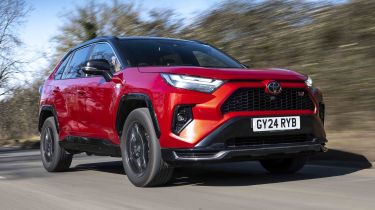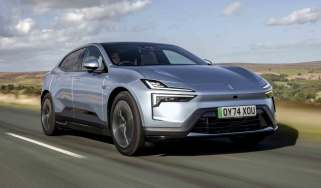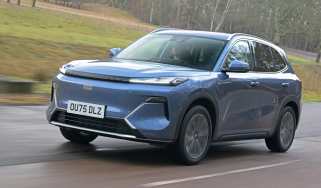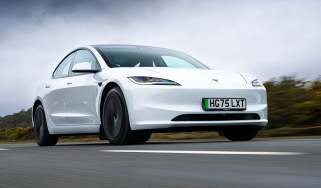Toyota RAV4 review
Global best seller offers practicality and efficiency in equal measure

Our opinion on the Toyota RAV4
Look at the global car sales charts, and the Toyota RAV4 is at or near the number one spot every year. It sells in big numbers in the US and the Far East, with buyers drawn to its combination of practicality, reliability and efficiency.
Here in the UK, a relatively high price tag means the RAV4 doesn’t sell in such large numbers, but it’s still a popular machine. Its choice of hybrid or plug-in hybrid variants helps EV sceptics make the transition to electrification without having to face range anxiety.
The fifth-generation model has been offered since 2018, and is due to be replaced in 2026, so there are just two variants available at the moment. There’s Design trim at the entry point to the range, plus the racier GR Sport with a sharper look. Both are offered in Plug-in guise, with the full hybrid currently off sale.
Key specs | |
| Fuel type | Petrol-electric hybrid, petrol-electric plug-in hybrid |
| Body style | Five-door, five-seat SUV |
| Powertrain | 2.5-litre 4cyl petrol, plus 1x e-motor, front-wheel drive 2.5-litre 4cyl petrol, plus 2x e-motors, four-wheel drive |
| Safety | Five-star Euro NCAP (2019) |
| Warranty | Three years/60,000 miles |
About the Toyota RAV4
The Toyota RAV4 has been a staple of the Japanese firm’s line-up since it first arrived more than 30 years ago, when it set the template for the compact SUV sector. The current car is the fifth generation, and it sits above the Yaris Cross and C-HR in Toyota’s UK line-up. It was briefly joined by the seven-seat Highlander for a couple of years, but now the three-row Land Cruiser is the only Toyota SUV that’s bigger on these shores.
Used - available now
There’s no nonsense to the RAV4 line-up, with just one five-door, five-seat body style offered, and (until recently) hybrid or plug-in petrol powertrains to choose from, the former is either front or four-wheel drive. There are Design and GR Sport trims offered, with the latter coming with a look that’s inspired by Toyota’s racing division.
Since the RAV4 is now only available as a plug-in hybrid, prices look a little steep, but they’re actually on a par with PHEV rivals such as the Volkswagen Tiguan, Cupra Terramar and Skoda Kodiaq e-Hybrids.
Toyota RAV4 prices and latest deals
Performance & driving experience
| Pros |
|
| Cons |
|
As you might expect from a family-friendly SUV, the Toyota RAV4 is safe and secure on the road, but it also delivers decent handling, courtesy of its TNGA platform. The powertrains are decent, too, with the electric motors providing a boost to the petrol engines. In standard hybrid guise there’s 215bhp going to the front wheels, while the 4WD model adds a second electric motor for four-wheel drive and a total output of 219bhp.
The RAV4 Plug-in has the same 4WD configuration, but adds an 18.1kWh battery and a boost in performance to help cope with its extra weight, so there’s a healthy 302bhp on offer. All models feature a CVT-style gearbox with no fixed ratios, although Toyota has added ‘steps’ to the transmission to make it feel more like a conventional auto.
Performance, 0-60mph acceleration and top speed
The RAV4 delivers decent performance, with sub-10 second 0-60mph times across the board. The front-wheel-drive model manages the 0-62mph sprint in 8.4 seconds, while the added traction of four-wheel drive sees the time cut to 8.1 seconds.
For the PHEV version, the 0-62mph time is a hot hatch-rivalling six seconds exactly, although the tall body and the way the powertrain delivers this acceleration means it doesn’t feel particularly sporty. As with the hybrid models, the Plug-in’s top speed is limited to 112mph.
Town driving, visibility and parking
Light steering means low-speed manoeuvring is a doddle in the RAV4, while the tall driving position affords a decent view out. There’s a bit of limited visibility behind because of the substantial C-pillars, but front and rear parking sensors are fitted as standard across the range. The Design model features a reversing camera, while the GR Sport uses multiple cameras to give an overhead view of your surroundings.
Stay smooth on the throttle, and when the hybrid’s petrol engine fires up – and you won’t be going very far on electric power alone before it does – it does so without too much fuss, just a distant hum from under the bonnet. It’s a similar story in the Plug-in, although if the battery is fully charged then it will be far longer before the petrol engine engages.
The Plug-in is happy to drive around on electric power alone, and the response from the system means that it feels quick at urban speeds and can easily keep pace with other traffic.
B-road driving and handling
On twistier roads, the RAV4’s chassis is agile, while the steering has a decent weight and feels positive, with keen turn-in for an SUV. The heavy hybrid running gear can be felt as the weight moves around – especially in the Plug-in – but the RAV4 remains well controlled.
Throttle response is good, although you do need to get used to the disconnect between engine revs and forward motion. As with other hybrid models, the engine revs away independently of your road speed, while the electric motors help to fill in the power gap as you accelerate. It’s effective once you’re used to it and the RAV4 feels responsive, particularly in Plug-in guise, where the snappy throttle is surprising.
While the RAV4 has a CVT-style auto, there are paddles on the back of the steering wheel that allow you to ‘shift’ gears. The steps don’t really make much difference to the way the car performs, though, and the system will revert to auto mode if they’re not touched for a time when driving.
Braking power is strong and there’s a decent feel through the pedal, with a smooth transition between energy recovery and the physical discs and pads. Unlike rivals, there’s no facility to boost resistance in the system to help plough energy back into the battery.
Motorway driving and long-distance comfort
While the engine will rev away when getting up to speed, the RAV4 soon settles to deliver good refinement. Unlike some PHEVs, the Toyota’s powertrain will still swap between electric and petrol sources even at higher speeds – there’s a small green EV mode light on the dashboard that shows you when electric drive is being used – and when the engine does cut in, it’s relatively hushed and distant. The car’s ride is comfortable, too, although the GR Sport with its larger 19-inch wheels is a little firmer, but not so much as to be harsh.
| Model | Power | 0-62mph | Top speed |
| 2.5 VVT-i 2WD | 215bhp | 8.4s | 112mph |
| 2.5 VVT-i 4WD | 219bhp | 8.1s | 112mph |
| 2.5 VVT-i PHEV 4WD | 302bhp | 6.0s | 112mph |
"The RAV4’s upright looks and position as a family-friendly SUV mean it comes as a bit of a surprise to find that it delivers tidy handling that’s among the front runners in the class. Combine this with the punchy PHEV powertrain, and there’s a surprising amount of fun to be had.” - Dean Gibson, Senior test editor. Drove the RAV4 Plug-in versus the Cupra Terramar in a twin test.
MPG & running costs
| Pros |
|
| Cons |
|
With more than a quarter of a century of hybrid development under its belt, Toyota is a dab hand at the technology. However, the fifth-generation RAV4 is only the second version to feature the petrol-electric tech.
The set-up of 2.5-litre petrol four-cylinder engine and one or two electric motors is one that is also used by the Lexus NX, and it’s a combination that delivers strong efficiency for a relatively large family SUV. The standard hybrid has a quoted economy figure of 50.4mpg, while adding four-wheel drive only has a slight impact on that figure, at 48.7mpg.
When we’ve tested the RAV4 hybrid, we’ve easily managed to keep fuel economy in the 40mpg range. Because the electric drive system works even at motorway speeds, the car delivers efficiency in all driving situations, although it’s worth pointing out that the more low-speed driving you do, the better MPG you’ll achieve due to more frequent running in EV mode.
The RAV4 Plug-in is equally capable of delivering great efficiency. Unlike some PHEVs that simply fall back to petrol power once their drive battery is exhausted, the RAV4 retains some charge for it to use in everyday driving, so it should be just as efficient as the standard hybrid model. Of course there’s the added bonus of longer all-electric driving if you keep the battery charged, while a hold function allows you to save the battery charge for when you need it – if you’re doing some motorway work followed by urban driving, for example.
| Model | MPG | CO2 | Insurance group |
| 2.5 VVT-i 2WD | 50.4mpg | 129g/km | 26 |
| 2.5 VVT-i AWD | 48.7mpg | 131g/km | 28 |
| 2.5 VVT-i Plug-in | 282.4mpg | 22g/km | 36 |
Electric range, battery life and charge time
The RAV4 Plug-in comes with an 18.1kWh drive battery, and while that’s more than 10 times the size of the 1.6kWh pack found in the standard RAV4 hybrid, it’s no longer a competitive size when compared with PHEV rivals.
Toyota quotes a WLTP-tested all-electric range of 46.5 miles from a full charge. This could be plenty for most everyday needs, and when we ran a RAV4 Plug-in on our long-term fleet, we consistently saw a range of around 40 miles from the car’s trip computer.
Those figures look decent in isolation, but the latest PHEV rivals come with larger packs and are now edging closer to double that distance for official figures. However, one area where the RAV4 still does well is with its efficiency when the battery is run down, because it drives more like a hybrid than a pure-petrol model.
| Model | Battery size | Range | Insurance group |
| 2.5 VVT-i Plug-in | 18.1kWh | 46.5 miles | 36 |
Insurance groups
The RAV4 sits in insurance groups 26 to 37, with the standard hybrid placed in the lower reaches, and with the more complex Plug-in starting at Group 36. That’s lower than group ratings for the rival Honda CR-V, but quite a bit higher than a Skoda Kodiaq or Cupra Terramar.
Tax
Since the RAV4 Plug-in has a starting price in excess of £40,000, it faces the luxury car road tax supplement for the first five years of ownership. However, that’s not uncommon in the world of PHEVs, so you won’t be saving anything by choosing one of its rivals.
For company buyers, the Plug-in has the most favourable Benefit-in-Kind (BiK) rates, but it’s at a disadvantage when compared with other PHEVs, because it can’t go as far on electricity and its emissions are higher. It sits around three percentage points higher than rival PHEVs such as the Cupra Terramar or VW Tiguan, so lower-rate taxpayers will face annual bills that are around £250-£300 higher.
Depreciation
Considering that the RAV4 is a well established model that’s been around for more than five years, residuals in the mid-50 per cent range are pretty impressive. That’s a match for newer models such as the Cupra Terramar, but plug-in versions of the VW Tiguan are still slightly ahead.
To get an accurate valuation on a specific model check out our free car valuation tool...
Interior, design & technology

| Pros |
|
| Cons |
|
Safe styling has helped the Toyota RAV4 sell in big numbers, although the chunky, squared-off look of the fifth-generation model does at least have a bit of an edge when compared with its predecessors. Upgrading to GR Sport trim adds some racy touches, such as larger diamond-cut black alloy wheels, black and red detailing inside and out, plus the option of a contrast black roof. It looks smart, although it’s unlikely to turn many heads thanks to the RAV4’s sheer ubiquity. Metallic paint comes as standard on the GR Sport, although Platinum White and Scarlet Flare are a couple of hundred pounds extra.
Interior and dashboard design
There’s definitely a feeling that form follows function with the RAV4’s dashboard layout, with an array of buttons and controls laid out for ease of access ahead of any style considerations. That’s no bad thing because it means that the cabin is easy to get along with.
Materials and build quality
The quality of the plastics on board is a little on the hard side, but the leather-trimmed steering wheel feels good to hold, and the GR Sport features part-leather upholstery with suede-effect cloth inserts that add an upmarket touch. The rotary controls for the climate system are a particular highlight, with rubber edges that are easy to grip, and a satisfying action that makes adjustment easy.
Infotainment, sat-nav and stereo
The RAV4 comes with a 10.5-inch central touchscreen, but while that may have seemed large at the time of the car’s launch in 2019, it’s one of the smaller infotainment set-ups that’s now offered in the family SUV sector. The housing it’s mounted in has banks of shortcut buttons on either side and two rotary knobs for volume and tuning. While the physical buttons are small, they’re relatively easy to press when on the move.
The screen’s graphics are fine, but not quite up to the high resolution as seen in newer rivals, and the thin white-on-black lettering looks a little old fashioned, too. The software is reasonably responsive, though, and you can always bypass the on-board tech and use wireless Apple CarPlay or Android Auto instead.
As well as the central touchscreen, there’s also a 12.3-inch digital driver’s display. This isn’t as comprehensive as some set-ups, though, and the small central trip section is rather crammed in when the large speedometer is set to display in the main screen. There are also two permanent dials on either side of the main screen that show energy flow and fuel/charge levels.
“We’re fans of cars that have physical buttons and switches instead of placing everything on touchscreens, but the RAV4 goes a little too far in the opposite direction. Take the drive modes – where other cars have one button that cycles through different settings, there’s a rotary dial in the Toyota that switches between Eco and Sport settings, but Normal mode is set by pressing on top of said dial.” - Dean Gibson, Senior test editor. Drove the RAV4 Plug-in versus the Cupra Terramar in a twin test.
Boot space & practicality
| Pros |
|
| Cons |
|
Upright lines and a squared-off shape help create decent space inside the RAV4, although the dark interior colours make it feel a little more hemmed in than some rivals.
Dimensions and size
The Toyota RAV4 has upright proportions, and the tall body creates a generous amount of headroom inside. However, the car’s overall width isn’t as large as some rivals in the class, and this can be felt when it comes to passenger space, especially across the back seats.
| Dimensions | |
| Length | 4,600mm |
| Width | 1,855mm |
| Height | 1,690mm |
| Number of seats | Five |
| Boot space | 520-1,604 litres |
Driving position, seats & space in the front
That tall body creates the kind of lofty driving position that makes SUVs so appealing to many buyers, while the view out is good on the whole. Rearward vision is a bit limited, courtesy of tinted windows and thick C-pillars, but the rear parking sensors and camera system will help there.
There’s a wide range of wheel and seat adjustment on offer, so it’s easy to get comfortable, while the location of the touchscreen on top of the dash means it’s easy to reach from the driver’s seat. The two-zone climate controls are in a separate section on the dashboard for ease of use.
Storage is logically laid out, with a tray ahead of the drive selector for a smartphone (wireless charging is offered on the GR Sport model) twin cup-holders are located further back, while the central armrest opens to reveal a deep storage bin with a separate removable tray in the top. The door bins are only really big enough for two drinks cans side by side, while the glovebox is a fair size, plus there’s a small tray to the right of the steering wheel for small items.
Seats & space in the back
Shoulder room isn’t quite as generous here as it is in some rivals, courtesy of the RAV4’s relatively narrow body, but the high roof means there’s plenty of headroom. The back seat is set low and the middle chair is at the same level as the outer two, while a flat floor and good space under the front seats mean there won’t be a battle for foot space.
The rear door bins are similar to the ones up front, so they’re not very big, while back-seat passengers get twin air vents and USB ports, although unlike some rivals there’s no temperature control in the back.

Boot space
A powered tailgate opens to reveal a 520-litre boot in the RAV4 PHEV, which is 60 litres down on the capacity offered in the standard model. The high load lip means lifting heavy items in is slightly trickier than in rivals, but at least the rolling load cover is easy to use, especially if you need to remove it completely.
The boot floor itself isn’t a uniform shape, with large cutouts on either side to make way for the suspension and fuel system, but at least there’s under-floor storage for the charging cables - that’s a benefit of not having a huge drive battery.
The back seats fold in a 60:40 split and create 1,604 of space, down from 1,690 litres in the simple hybrid model, and the load floor is almost flat when they’re folded.

Towing
Cars in the family SUV class are likely to be called upon to tow, but the Toyota RAV4 can’t haul as much as some of its rivals. The best performer in the line-up is the AWD hybrid, which can haul 1,650kg. A maximum towing weight of 1,500kg is merely average for the Plug-in model, while the 2WD hybrid can only manage 800kg braked, which is only 50kg more than the unbraked maximum.
In comparison, the Cupra Terramar and Skoda Kodiaq can haul two tonnes in PHEV guise, and the former can manage 2,200kg when fitted with 2.0 TSI petrol power.
“Sitting in the back of the RAV4 is fine, but you don’t get the ‘stadium’-style layout that can be found in other rivals. This staggers the back seats so that they are a little taller and give a better view out, which can help with motion sickness. There’s certainly enough headroom inside to have the back seats mounted a bit higher.” - Dean Gibson, Senior test editor. Drove the RAV4 Plug-in versus the Cupra Terramar in a twin test.
Reliability & safety
| Pros |
|
| Cons |
|
When it comes to reliability, Toyota has an enviable record for building cars that are dependable and get the job done. There’s no reason to believe that the RAV4 would deviate from this formula, and the sheer numbers on the road across the globe should mean any issues come to light pretty quickly.
The RAV4 earned a five-star Euro NCAP rating for safety, but it was assessed in 2019, and the safety organisation’s six-year expiry date means the score is no longer valid in 2025. Compared with other cars tested at the same time, the Toyota’s high scores for adult occupant protection and child safety were only eclipsed by the Subaru Forester.
It’s worth noting that while the RAV4 features Toyota Safety Sense 2, so it gets lane departure warning, adaptive cruise control and more, blind-spot detection is only offered on the GR Sport model.
The 2024 Driver Power owner satisfaction survey saw the RAV4 place fourth out of 50 cars, beating rivals such as the Mazda CX-5, Citroen C5 Aircross and Kia Sportage in the process.
| Key standard safety features |
| Euro NCAP safety ratings |
|
As with the rest of the Toyota line-up the RAV4 has a three-year/60,000-mile warranty as standard, but this can be extended up to 10 years and 100,000 miles with regular annual servicing at an approved Toyota service centre. Each service adds 12 months and 10,000 miles of cover up to the 10-year maximum.
Buying and owning
Our best buy: Toyota RAV4 2.5 VVT-i Plug-in Design
There are just Design and GR Sport versions of the RAV4 Plug-in to choose from, but really the base model has plenty of kit to keep you satisfied. All you’re getting with the GR Sport is a different look, bigger wheels that add a firm edge to the ride, and some extra kit such as a top-down camera view, head-up display and blind-spot recognition
Toyota RAV4 owner reviews
Here’s what owners in the 2024 Driver Power survey thought of the Toyota RAV4.
| What they like | What they don't like |
| “Acceleration is more than adequate for UK roads, helped significantly by the electric motor’s torque.” | “It’s very unexciting. It’s not a car that inspires admiration or you look forward to driving.” |
| “All-round visibility is excellent. There are no major blind spots and the rear camera is fantastic.” | “When you need the rear camera most in poor weather, it is obscured by water and quite useless.” |
| “I feel that the quality and technical specification of this vehicle, for under £40k, are really very good.” | “The touchscreen display is clunky and outdated, and it’s missing key features such as Android Auto.” |
| “I like how the hybrid system delivers diesel-like economy for petrol prices. Using EV mode in town is a real plus.” | “Fuel economy could be better, while the infotainment isn’t that user-friendly and could be more intuitive.” |
| “My last two cars were Toyotas. I expected total reliability with my RAV4 and I’ve not been disappointed.” | “Very expensive. I doubt I’ll be able to replace my RAV4 with another, thanks to the high cost of the PCPs.” |
| “The steering isn’t as good as a BMW’s but it’s fine, although it seems better when the car is fully loaded. The suspension copes well with poor surfaces.” | |
| “I often have loads of stuff with me in the car and there is ample storage space, while the boot is huge. They could have provided a map pocket in the back of the driver’s seat, though.” | |
| “My RAV4 has a good driving position, it’s very easy to drive and the excellent steering makes it all the more relaxing on longer journeys. The seats have plenty of adjustment for short or tall drivers; I just wish there was less tyre and road noise.” |
Frequently Asked Questions
If you’re in the market for a roomy five-seat SUV, then we’d stick the RAV4 on your shortlist. It offers plenty of space, it’s efficient and offers a decent drive, while there shouldn’t be any question marks over reliability from a brand such as Toyota.










